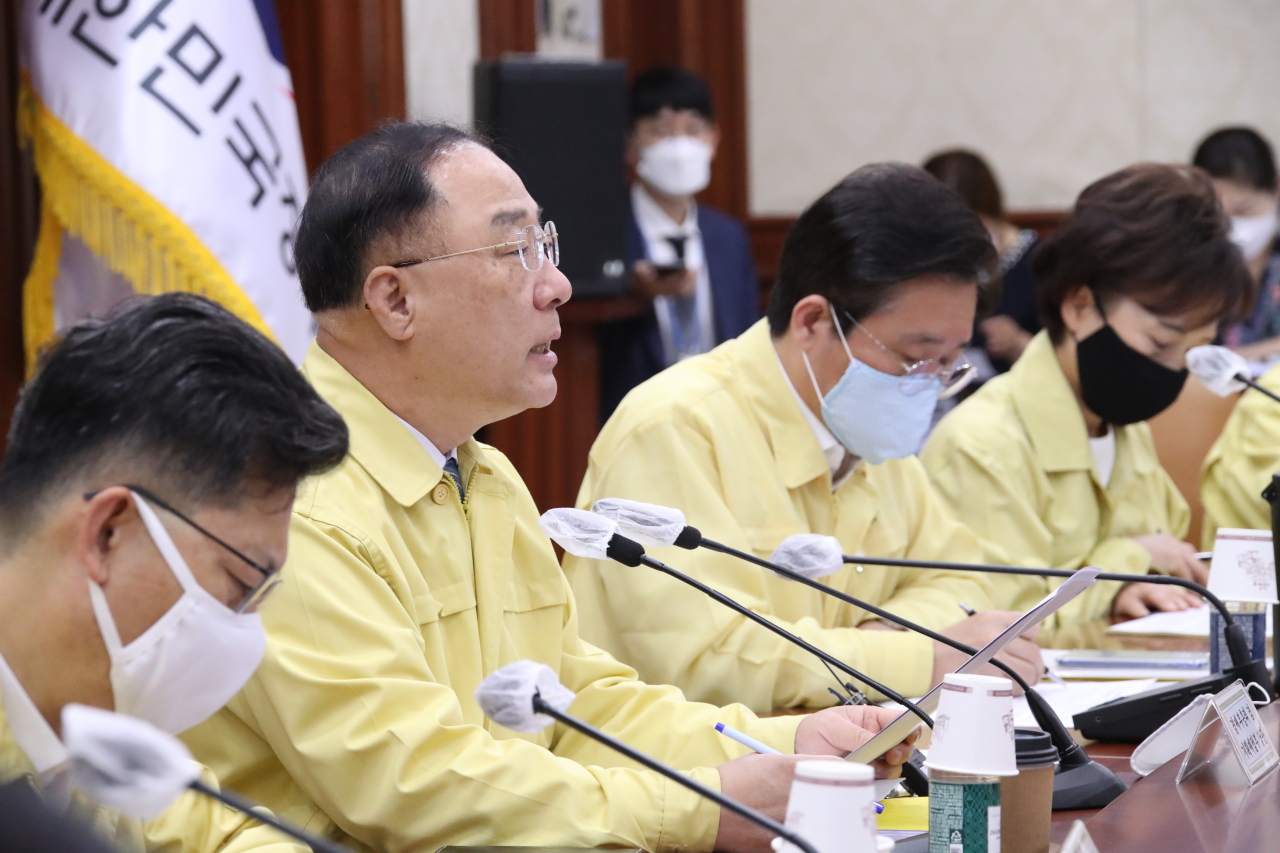S. Korea’s economy contracts 2.9% in Q2, worst since Asian financial crisis
By Bae HyunjungPublished : July 23, 2020 - 16:49

South Korea saw its economy shrink dramatically in the second quarter, marking its worst growth in more than two decades, feeling the impact from COVID-19 fallout, central bank data showed Thursday.
The chief fiscal policymaker, however, claimed that the country’s economic graph will rebound in the third quarter on the back of expansionary fiscal spending and new growth engines.
The country’s real gross domestic product for April-June fell 2.9 percent from a year earlier, according to advance data from the Bank of Korea.
This was the slowest growth since the 3.8 percent on-year contraction observed in the fourth quarter of 1998, when Asia’s fourth-largest economy was reeling under the Asian financial crisis.
The key dampening factor for Korea’s trade-dependent economy was its exports, which plunged 13.6 percent on-year in the second quarter, dipping steeply from a 5.6 percent on-year rise in the previous quarter. The figure was also the sharpest on-year decline since the fourth quarter of 1974.
In a quarter-to-quarter comparison, the local economy contracted 3.3 percent, marking the slowest on-quarter growth since 6.8 percent seen in the first quarter of 1998.
Earlier in the first quarter, when the effects of the COVID-19 pandemic were not yet at their highest, the Korean economy declined 1.3 percent on-quarter, but expanded 1.4 percent on-year.
Announcing the performance for the first quarter, the BOK anticipated that the economy will shrink about 2 percent on-year for the April-June period. The annual growth outlook was anticipated at a 0.2 percent contraction.
“(The latest result) was largely due to the sharp drop in exports amid the persisting COVID-19 spread, which contradicted our expectation that such downtrend will slow down,” said Park Yang-su, economic statistics director at BOK.
The economic growth for the rest of the year will depend mostly on the future development of the disease and consequent economic lockdowns in other countries, according to Park.
He, however, underlined that the slower-than-expected quarterly growth for April-June will not necessarily lead to an equally large decline in the annual growth rate, suggesting a wait-and-see approach.
“There is the possibility that key countries will not enhance their lockdown policies even under a secondary outbreak, in fear of economic recession,” Park said.
“Also, the recently rebounding Chinese economy will have a positive impact on our economy.”
BOK Gov. Lee Ju-yeol noted last week that the country’s economy is likely to suffer a heavier loss than previously suggested.
“When we presented the growth outlook in May, we had expected the pandemic to begin to slow down in the second half of the year,” the monetary policymaker said.
“Now we are already in the second week of July, but the epidemic spread is persisting, even accelerating.”
In May, the BOK predicted the economy would contract by a maximum 1.8 percent on-year in 2020.
Seoul’s central bank is set to announce its revised growth outlook for this year on Aug. 27.
Meanwhile, Deputy Prime Minister and Finance Minister Hong Nam-ki displayed confidence and claimed that the worst may now be over, citing the government’s fiscal actions such as the “Korean New Deal” project.
“The domestic market showed some recovery in the second quarter but the GDP growth turned out lower than expected mostly because of external factors,” the fiscal chief said.
“Should the current situations prolong, the economy is likely to rebound significantly in the third quarter.”
By Bae Hyun-jung (tellme@heraldcorp.com)



![[AtoZ into Korean mind] Humor in Korea: Navigating the line between what's funny and not](http://res.heraldm.com/phpwas/restmb_idxmake.php?idx=644&simg=/content/image/2024/04/22/20240422050642_0.jpg&u=)
![[Exclusive] Korean military set to ban iPhones over 'security' concerns](http://res.heraldm.com/phpwas/restmb_idxmake.php?idx=644&simg=/content/image/2024/04/23/20240423050599_0.jpg&u=20240423183955)



![[Graphic News] 77% of young Koreans still financially dependent](http://res.heraldm.com/phpwas/restmb_idxmake.php?idx=644&simg=/content/image/2024/04/22/20240422050762_0.gif&u=)
![[Herald Interview] Why Toss invited hackers to penetrate its system](http://res.heraldm.com/phpwas/restmb_idxmake.php?idx=644&simg=/content/image/2024/04/22/20240422050569_0.jpg&u=20240422150649)





![[Exclusive] Korean military to ban iPhones over security issues](http://res.heraldm.com/phpwas/restmb_idxmake.php?idx=652&simg=/content/image/2024/04/23/20240423050599_0.jpg&u=20240423183955)



![[Today’s K-pop] Ateez confirms US tour details](http://res.heraldm.com/phpwas/restmb_idxmake.php?idx=642&simg=/content/image/2024/04/23/20240423050700_0.jpg&u=)